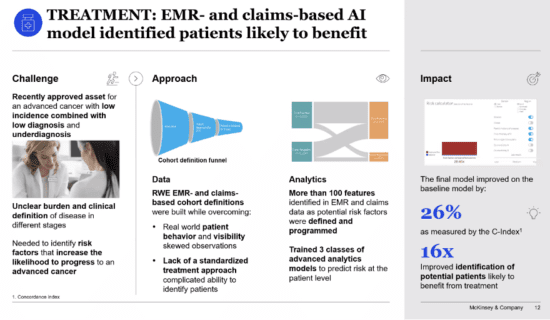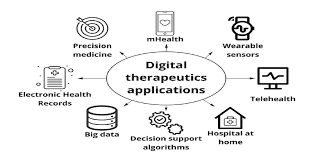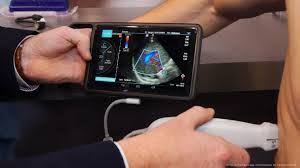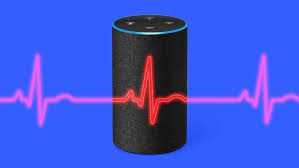AI in Precision Medicine I

Genomics is enabling more individualized treatment by providing insights into which genes contribute to various medical conditions. For example, scientists are currently using genomics to understand how COVID-19 spreads and affects the immune system. This information could help with vaccine development. A single human genome sequence generates between 300GB to 1TB of data. Technological […]
AI in Mental Health Therapeutics

We’ve already discussed how AI and mobile devices can be a powerful combination to remotely diagnose and monitor mental health conditions. The emerging digital biomarkers that can detect mood based on voice, activity and interaction with smart devices will be vital for the better diagnosis and management of mental health. It turns out that this […]
AI and Robotics

The use of robotics in healthcare isn’t new. The Davinci system has been used for various types of surgeries and the uses cases have been expanding for some time now. Recently, with the introduction of AI in healthcare and its expanding use cases, some interesting overlaps between these two areas are emerging. One of […]
Digital Therapeutics

DIGITAL THERAPEUTICS have gained momentum in recent years. What was once thought to be an adjunctive form of treatment at best and a toy at worst is now headed toward mainstream clinical practice. There are FDA-approved solutions for a number of conditions, including addiction, depression and PTSD. Some of these are prescription treatments and are […]
AI in Democratizing Care

AI may be able to make certain types of tests and therapeutics more available to a larger swath of the population because it could help frontline clinicians, like primary care doctors and nurse practitioners, to perform specialized testing like ultrasounds. That’s because AI can provide real-time guidance and feedback that will enable them to perform […]
Sound AI II

Google is also using its smart devices for health monitoring, as is shown by the fact that they updated their Nest Hub with a sleep tracking feature. It uses the combination of radar and an algorithm to track sleep and to detect snoring and coughing. In the future, we can expect researchers to build on […]
Sound AI I

Given how we’re increasingly engaged in the digital world using our smart phones, joining Zoom meetings, exchanging voice messages and interacting with home assistants like Alexa, a huge number of sound files are being created. These sound files are digital and contain structured data. This is a great resource for AI algorithms to mine for […]
AI For Remote Examination

Other key applications involve using AI in hardware that can collect key biometric data or enable onsite and remote physical examinations. Companies such as Eko, Tytocare and Aevice Health allow for the remote examination of heart and lung sounds, eyes and ears thanks to AI-embedded stethoscopes and other hardware. AI-based smartphone exams are being considered […]
Passive Monitoring Using AI

AI-powered passive monitoring is taking off and has huge advantages over the traditional way of monitoring patients. The advantage of passive monitoring, as opposed to data collected from wearables, is that it doesn’t require patients or seniors to actively wear a device at all times. Used in a hospital setting, the tech reduces healthcare workers’ […]
AI for Rapid Diagnostics II

In recent years, smartphone penetration in the United States has continued to grow. At the same time, deep learning has helped to significantly lower the error rate of image recognition tools. The two of these in combination have helped to open up new possibilities for us to use smartphones as diagnostic tools. One company […]
